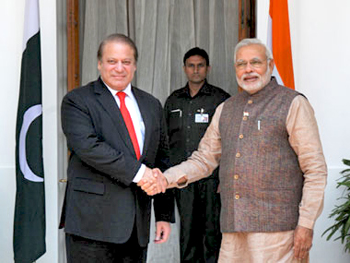New Delhi, Jul 6: Prime Minister Narendra Modi will leave for an eight-day official visit to five Central Asian countries and Russia, starting from Uzbekistan on Monday.

Furthermore, according to news channels, on the sidelines of SCO summit in Russia this week, PM Modi will meet his Pakistani counterpart Nawaz Sharif.
The Prime Minister's Office (PMO) is soon expected to make an official announcement about the same. This would be the first formal meeting between the leaders of both the South-Asian countries after May, 2014, when PM Modi had invited leaders of all SAARC nations to attend his swearing-in ceremony.
Last week, Pakistan had also indicated about a possible meeting between PM Nawaz Sharif and his Indian counterpart Narendra Modi on the sidelines of the annual SCO summit in Russia, saying such meetings in a multilateral setting are a "normal feature".
The development comes days after PM Modi had called Sharif at the start of the holy month of Ramzan, saying that he wanted good relations with Pakistan.
In November 2014, PM Modi and Nawaz Sharif last met at the SAARC summit in Kathmandu, though they did not hold any formal talks.
Meanwhile, with focus on enhancing strategic, economic and energy ties, on July 7 and 8, PM Modi will be in Kazakhstan, India`s largest trading partner in Central Asia. He will meet President Nursultan Nazarbayev and Prime Miniter Karim Massimov.
Notably, Narendra Modi will he the first Indian Prime Minister in recent times to visit all five Central Asian countries at one go.
India will seek to boost energy cooperation and trade with the five nations, which were part of the erstwhile Soviet Union.
In Ufa, the summit of the five BRICS countries -- Brazil, Russia, India, China and South Africa -- comes as the board of governors of the BRICS bank, called the New Development Bank, holds its first meet in on Tuesday. The bank`s president is India`s MV Kamath.
Writing about the visit on his Facebook page, PM Modi said his first stop will be Uzbekistan, where he will hold talks with President Islam Karimov and both sides would ink key agreements to strengthen cooperation.
PM further said he would be interacting with Indologists, students learning Hindi and members of the Indian community.
"It was in Tashkent that we lost one of our most popular and respected leaders, Shri Lal Bahadur Shastri ji, who ignited our nation with the clarion call of `Jai Jawan, Jai Kisan`. I will be paying my tributes to this proud son of India during the visit," Modi said.
In Kazakhstan, Modi said he will hold talks with President Nursultan Nazarbayev, and Prime Minister Karim Massimov.
"There will be delegation level talks with President Nazarbayev followed by the signing of documents and a joint press statement," he said.
PM Modi said he looks forward to interacting with the youth of Kazakhstan at the Nazarbayev University.
He will also inaugurate the India-Kazakhstan Centre for Excellence in Information and Communication Technology at the LN Gumilev Eurasian National University and also join a wreath-laying ceremony and planting of sapling at the Monument of Defenders of Motherland.
PM Narendra Modi will then visit Ufa for the 7th BRICS Summit and SCO Summit.
PM Modi added that he will be meeting the leaders - Brazil`s President Dilma Rousseff, China`s Xi Jinping, Russia`s Vladimir Putin and South Africa`s Jacob Zuma - individually too at the Ufa and also meet business leaders.
At the Shanghai Cooperation Organisation (SCO) summit, India is an observer but is hoping to be included as a permanent member.
He flies to Turkmenistan on July 11 -- in the first visit by an Indian prime minister after PV Narasimha Rao in 1995.
Modi also said he will hold talks with President Gurbanguly Berdimuhamedov, which would be followed by signing of agreements and a meeting with the press.
He will also inaugurate a statue of Mahatma Gandhi and a Traditional Medicine and Yoga Centre and also lay wreath at the mausoleum of the first president.
His next visit on July 12 would be to Kyrgyzstan, in the first prime ministerial visit in the last 20 years.
PM Modi would also hold talks with President Almazbek Atambaye and meet Prime Minister Semir Tariyev and Speaker of the Parliament Asylbek Jeenbekov.
India is gifting medical equipment to Kyrgyz Field Hospital.
Modi will also inaugurate tele-medicine links, which shall promote medical tourism from Kyrgyzstan to India. A statue of Mahatma Gandhi will also be unveiled.
On Tajikistan, his last stop, Modi said the last prime ministerial visit from India was by former prime minister Atal Bihari Vajpayee in November 2003.
He said India and Tajikistan have a strategic partnership and very strong defence cooperation, but economic cooperation has been limited and the scope of growth was immense. Bilateral trade has huge potential.
A statue of Rabindranath Tagore will also be unveiled in Dushanbe.






Comments
Add new comment